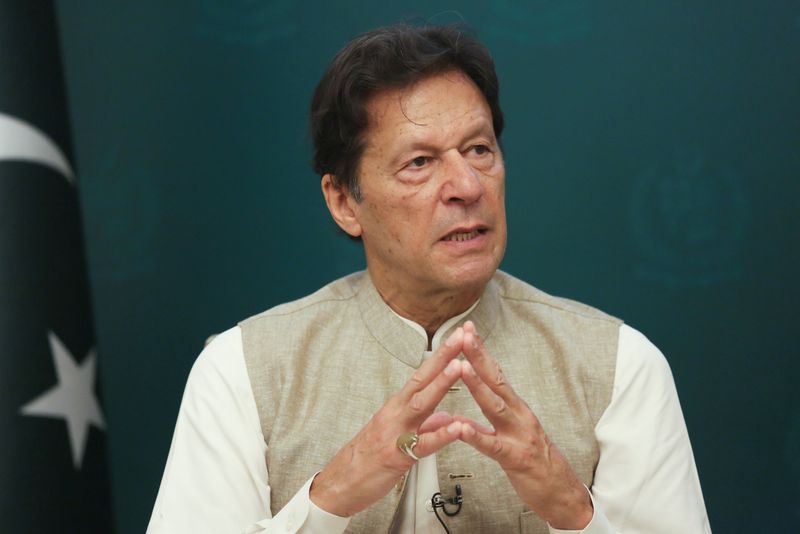By Asif Shahzad
ISLAMABAD -Imran Khan was ousted as Pakistan's prime minister on Sunday after a no-confidence vote in parliament, bringing to a premature end a tenure marked by a deteriorating economy and signs that he had lost the trust of the powerful military.
Defections from his coalition reflected growing disillusionment among many Pakistanis over high inflation, rising deficits and the perception that Khan had failed to realise his campaign promises of stamping out corruption.
He is unlikely to disappear from the political scene altogether, however.
After the Supreme Court overturned his decision to dissolve parliament and ordered lawmakers to return to the lower chamber, one ally called the move a judicial coup and Khan said he would continue to fight "till the last ball".
The 69-year-old joins a lengthening list of elected Pakistani premiers who have failed to see out their full terms; none has done so since independence in 1947.
In 2018, the cricket legend who led Pakistan to its only World Cup win in 1992, rallied the country behind his vision of a corruption-free, prosperous country respected on the world stage.
But the firebrand nationalist's fame and charisma were not enough to keep him in power.
Ironically for a politician once criticised for being under the thumb of the powerful military establishment, his ouster comes amid signs of worsening relations between him and army chief General Qamar Javed Bajwa.
The military, which has an outsized role in Pakistan having ruled the country for nearly half of its history and won control over some of its biggest economic institutions, has said it remains neutral towards politics.
At a rally last month, as he was fighting for his political survival, Khan was widely seen to be referring to that position when he said: "Only animals remain neutral."
"They (the military) don't want to be seen as supporting him and be blamed for his failures," said opposition leader and former Prime Minister Shahid Khaqan Abbasi. "They've pulled their support."
LOFTY PROMISES
Handsome and charismatic, Khan first grabbed the world's attention in the early 1970s as an aggressive fast-paced bowler with a distinctive leaping action.
He went on to become one of the world's best all-rounders and a hero in cricket-mad Pakistan, and he captained a team of wayward stars from bleak prospects to victory in 1992, urging his players on with the famed battle cry to fight "like cornered tigers".
After retiring from cricket that year, he became known for his philanthropy, raising $25 million to open a cancer hospital in memory of his mother, before entering politics with the establishment of his Tehreek-i-Insaf (PTI), or Pakistan Movement for Justice party, in 1996.
Despite his fame, the PTI languished in Pakistan's political wilderness, not winning a seat other than Khan's for 17 years.
This period had its dramatic moments, however. In 2007, Khan escaped house arrest by leaping over a wall amid a crackdown on opposition figures by then-military ruler General Pervez Musharraf.
In 2011, Khan began drawing huge crowds of young Pakistanis disillusioned with endemic corruption, chronic electricity shortages and crises in education and unemployment.
He drew even greater backing in the ensuing years, with educated Pakistani expatriates leaving their jobs to work for his party and pop musicians and actors joining him on the campaign trail.
His goal, Khan told a gathering of hundreds of thousands of supporters in 2018, was to turn Pakistan from a country with a "small group of wealthy and a sea of poor" into an "example for a humane system, a just system, for the world, of what an Islamic welfare state is".
That year he was at long last victorious, marking a rare ascension by a sporting hero to the pinnacle of politics. Observers cautioned, however, that his biggest enemy was his own rhetoric, having raised supporters' hopes sky high.
PLAYBOY TO REFORMER
Born in 1952, the son of a civil engineer, Imran Ahmed Khan Niazi described himself as a shy child who grew up with four sisters in an affluent urban Pashtun family in Lahore, Pakistan's second-biggest city.
After a privileged education in Lahore, during which his cricketing skills became evident, he went on to the University of Oxford where he graduated with a degree in Philosophy, Politics, and Economics.
As his cricket career flourished, he developed a playboy reputation in London in the late 1970s.
In 1995, he married Jemima Goldsmith, daughter of business tycoon James Goldsmith. The couple, who had two sons together, divorced in 2004. A second brief marriage to TV journalist Reham Nayyar Khan also ended in divorce.
His third marriage to Bushra Bibi, a spiritual leader whom Khan had come to know during his visits to a 13th century shrine in Pakistan, reflected his deepening interest in Sufism - a form of Islamic practice that emphasises spiritual closeness to God.
Once in power, Khan embarked on his plan of building a "welfare" state modelled on what he said was an ideal system dating back to the Islamic world some 14 centuries earlier.
His government made a number of key appointments based on qualifications and not political favours and sought to reform hiring in the bureaucracy and civil service.
Other measures included making it easier for citizens to lodge complaints and the introduction of universal healthcare for the poor in one province with plans to expand the programme nationally. The government also began a project to plant 10 billion trees to reverse decades of deforestation.
To bolster a crippled economy, Khan made a significant U-turn in policy and secured an IMF bailout for Pakistan and set lofty, albeit unmet goals, to expand tax collection.
But his anti-corruption drive was heavily criticised as a tool for sidelining political opponents - many of whom were imprisoned on charges of graft.
Pakistan's generals also remained powerful and military officers, retired and serving, were placed in charge of more than a dozen civilian institutions.
